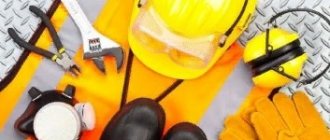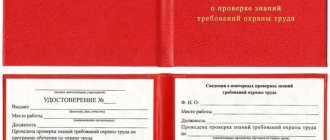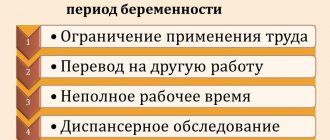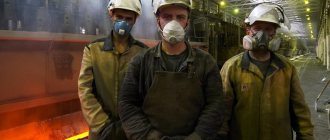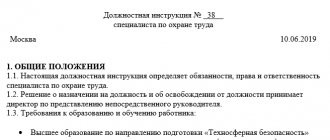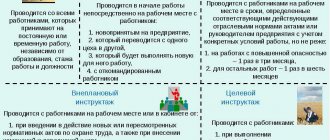What does Rostekhnadzor control?
What Rostechnadzor checks
In accordance with Government Decree No. 401 of July 30, 2004, the Federal Service for Environmental, Technological and Nuclear Supervision (abbreviated as Rostechnadzor) is vested with a wide range of powers, including:
- issuance of permits for the right to use nuclear energy, operate hydraulic structures, release pollutants into the environment;
- consumer permission to operate power receiving devices;
- registration and maintenance of a register of hazardous production facilities;
- licensing of activities related to conducting industrial safety examinations, carrying out surveying work (geodetic surveys of mining operations), as well as activities related to the handling of explosive materials for industrial use;
- checking compliance with legislative requirements in the field of environmental, technical and nuclear safety.
Whom does Rostechnadzor check?
Considering the scope of control functions and powers, Rostechnadzor can inspect almost any enterprise in order to monitor compliance of activities with the norms of current legislation. At the same time, the body pays the greatest attention to monitoring the activities of nuclear and energy enterprises, as well as hazardous industrial facilities.
| No. | Scope of control of Rostechnadzor | Whom does Rostechnadzor check? |
| 1 | Nuclear and radiation safety | Rostechnadzor controls nuclear industry enterprises (nuclear power plants, nuclear research facilities), as well as organizations that act as consumers of nuclear energy. The body also carries out accounting of nuclear materials and radioactive substances. |
| 2 | Energy security | In order to monitor compliance with energy legislation, Rostechnadzor has the right to inspect almost any enterprise that uses electrical equipment or is engaged in the construction and design of buildings using energy facilities. |
| 3 | Industrial Safety | When implementing measures to comply with industrial safety, the body carries out inspections:
|
| 4 | Construction safety | Rostekhnadzor monitors the activities of developers, as well as architectural, design, engineering and survey organizations to ensure that their activities comply with established construction safety requirements. |
When does Rostechnadzor conduct inspections?
In order to monitor compliance with current legislation in the field of nuclear, technical and energy safety, Rostechnadzor conducts inspections of organizations, entrepreneurs, and individuals. Depending on the type of organization of control, inspections can be carried out scheduled or unscheduled; according to the form of implementation of control activities, inspections can include an inspector’s visit (on-site inspection) or involve checking the company’s documents at the inspector’s workplace (documentary inspection).
Scheduled and unscheduled inspections
Rostechnadzor conducts scheduled inspections of organizations and enterprises according to the approved schedule. The body does not have the right to carry out planned control activities more than once every 3 years. Information on the timing of scheduled inspections of legal entities is publicly available; the schedule of scheduled inspections for 2020 can be found on the official website of the Federal Service (https://www.gosnadzor.ru/activity/control/plans/).
Rostechnadzor has the right to come to enterprises for an unscheduled inspection if one of the following grounds exists:
- Complaint from the public. Any citizen has the right to file a complaint with Rostechnadzor regarding the organization’s violation of labor protection standards, the law on environmental protection, and other provisions and norms, control over compliance with which is entrusted to Rostechnadzor.
- Checking compliance with the order. If, based on the results of a previous inspection (scheduled or unscheduled), Rostechnadzor identified violations and issued an order to eliminate them, then after the expiration of the established period, the inspector has the right to visit the enterprise on an unscheduled basis in order to verify compliance with the order.
- Accident at the enterprise. The basis for an unscheduled visit by an inspector from Rospotrebnadzor may be an accident at an enterprise or another extraordinary event that resulted in harm to the environment, the health of employees, or created a safety threat for citizens living nearby.
In each case, the documentary basis for an unscheduled inspection is the corresponding resolution signed by the head of the territorial body of Rostechnadzor.
The essence of three-stage control
Three-stage control is carried out not only at the will of the employer, but also through his efforts. It has two goals:
- involve the workforce in monitoring compliance with safe conditions, increase staff responsibility;
- respond in a timely manner to existing or emerging shortcomings, avoiding serious consequences with a tragic outcome.
The essence of control is that employees and managers of the organization themselves check whether labor protection in the workplace is properly organized.
What Rostechnadzor checks
During the inspection, the Rostechnadzor inspector can perform the following actions:
- request documents for verification, seize documents for subsequent examination;
- inspect production, office, warehouse and other premises, equipment, and other production facilities;
- conduct interrogations of management and employees of the organization.
In 2020, Rostechnadzor introduced checklists that record a list of questions asked to responsible persons of the enterprise during the inspection. In total, the body approved 50 checklists of the established form, which are used depending on the scope of activity of the company being inspected.
The Rostechnadzor checklist with a general list of questions on industrial safety can be downloaded here ⇒ Rostechnadzor checklist (general industrial safety requirements).
The Rostechnadzor checklist for gas stations can be downloaded here ⇒ Rostechnadzor checklist for gas stations.
Below we will look in detail at what exactly Rostechnadzor checks during scheduled and unscheduled control activities.
Verification of documents
At the initial stage, Rostechnadzor requests the following documents for verification:
- statutory documents of the enterprise;
- local regulations governing the use of electrical equipment, lifting mechanisms, and other production facilities (including hazardous ones);
- regulations on labor protection;
- certificates for the equipment used, electrical appliances, etc.;
- licenses (if the enterprise’s activities are subject to licensing);
- documents about the hazardous production facility (if any): registration in the register, permission to commission, license to use;
- documents on safety measures taken (Safety Briefing Log);
- accident log;
- equipment maintenance log;
- liability risk insurance contract;
- employment contracts with employees who are involved in working in hazardous working conditions or at hazardous production facilities.
During the inspection, Rostechnadzor has the right to request other documents within its powers, and, if necessary, to seize them for subsequent verification or examination for authenticity.
Control of operation of hazardous production facilities
After checking the documents, the inspector carries out a direct inspection of the objects, namely:
- production equipment;
- working conditions;
- premises.
Only the inspector whose name is indicated in the order for the inspection has the right to inspect the equipment. The purpose of the inspection is to certify the facility’s compliance with established safety standards, check the equipment for serviceability, and confirm the correct operation of the facility.
Checking compliance with regulations
If we are talking about an unscheduled inspection after the expiration of the validity period for fulfilling the order, then Rostechnadzor inspects enterprises not for the purpose of eliminating previously identified violations. At the same time, the inspector is assigned the right to conduct additional inspections of other objects, except for those for which violations were previously identified. The inspector also has the right to request any documents in accordance with the powers of Rostechnadzor.
After completing the inspection, the Rostechnadzor inspector draws up a report of the established form and passes it on to the organization’s representative for review. If the enterprise does not agree with the results of the inspection described in the act, or considers the issued order about violations to be unfounded, then the representative of the organization has the right to appeal it by filing a corresponding application with Rostechnadzor.
Organization of control over the state of working conditions in the workplace
In accordance with the Labor Code and the Federal Law “On the Fundamentals of Labor Safety” in the Russian Federation, the functions of organizing the state of working conditions in the workplace are assigned to the employer.
In practice, the following types of control and supervision operate:
state supervision of compliance with labor protection requirements;
public control over compliance with labor protection requirements;
in-production control over the state of working conditions and labor protection.
In-production control over the state of labor conditions and safety in small business organizations is headed by the employer or a person authorized by him.
Constant preventive monitoring of the state of conditions and labor protection in the workplace is one of the means of preventing industrial injuries and is carried out by promptly identifying deviations from the requirements of rules and safety standards and taking the necessary measures to eliminate them.
The main principle of control is regular inspections carried out by managers at different levels of production management according to a certain scheme.
According to established practice, control over labor conditions and safety is carried out in three stages:
The first stage is at workplaces, in teams, production areas. It is carried out by the workers themselves, foremen, foremen, superintendents - daily, depending on the current situation. Any deficiencies discovered are corrected immediately. More complex ones, which cannot be eliminated on your own, are reported to the relevant services. Work is usually suspended until problems are resolved.
The second stage is in production units, workshops, and branches. Conducted by the heads of these structures or special commissions. The participation of the organization’s labor protection specialist or the person assigned his responsibilities is mandatory. Deficiencies are eliminated immediately and short-term measures are drawn up. The frequency of this stage is usually monthly. The results of the first stage are developed and summarized.
The third stage - the organization as a whole is headed by its employer or a person authorized by it. Inspections are carried out on a commission basis. The effectiveness of the first and second stages is considered. The results are summed up at a general production meeting or a “labor safety” day is held - as a result, an order or order of the employer is issued, responsible persons are appointed, individual workers, specialists or teams are rewarded for good success in preventing industrial injuries, and measures are taken against violators. Frequency: quarterly, once every six months or as necessary, based on the results of inspections by state supervisory and control authorities.
Depending on the structure of the small business organization, the number of employees, their qualifications, production focus or type of services provided, a scheme of one or more of the above stages or a combination of them can be adopted.
In accordance with the Federal Law “On the Fundamentals of Labor Safety”
public control over compliance with the rights and legitimate interests of workers in the field of labor protection is carried out by trade unions and other representative bodies authorized by employees, which have the right to create their own inspections for these purposes, as well as elect authorized (trusted) persons for labor protection of trade unions and other representative bodies authorized by employees organs.
Trade unions represented by their relevant bodies, other representative bodies and persons authorized by employees have the right:
exercise control over the employer’s compliance with labor protection legislation;
conduct an independent examination of working conditions and safety of the organization’s employees;
take part in the investigation of industrial accidents and occupational diseases, as well as carry out their independent investigation;
receive information from managers and other officials of the organization about labor conditions and safety, as well as about all industrial accidents and occupational diseases;
make demands to suspend work in cases of threat to the life and health of workers;
issue mandatory submissions to employers regarding the elimination of identified violations of labor protection requirements;
carry out inspection of labor conditions and safety, fulfillment of employers’ obligations on labor protection provided for by collective agreements and agreements;
take part in the work of commissions for testing and commissioning of production facilities and means of production as independent experts;
take part in the development of draft by-laws and regulatory legal acts on labor protection, as well as coordinate them in the manner established by the Government of the Russian Federation;
contact the relevant authorities with demands to bring to justice those guilty of violating labor protection requirements and concealing the facts of industrial accidents;
take part in the consideration of labor disputes related to violations of labor protection legislation, obligations stipulated by collective agreements and agreements, as well as changes in working conditions.
Authorized (trusted) persons for labor protection of trade unions and other representative bodies authorized by employees have the right to freely check compliance with labor protection requirements in organizations and make proposals for elimination of identified violations of labor protection requirements, mandatory for consideration by officials.
In organizations with more than 10 employees, employers create committees (commissions) on labor protection. Their composition on a parity basis includes representatives of employers, trade unions or a representative body authorized by employees.
The labor protection committee (commissions) organizes the development of the section of the collective agreement (agreement) on labor protection, joint actions of the employer and employees to ensure labor protection requirements in the workplace and informing employees about the results of these inspections.
The employer is obliged to create the necessary conditions for persons exercising public control (members of committees), labor protection persons of trade unions and other representative bodies authorized by employees), provide them with rules, instructions, local orders and instructions, reference materials, as well as during the working day, allocate they have free time to perform these additional responsibilities.
State supervision and control over compliance with labor protection requirements is carried out by the Federal Labor Inspectorate - a unified federal centralized system of government bodies.
The regulations on the federal labor inspection are approved by the Government of the Russian Federation.
State labor inspectors of the Federal Labor Inspectorate, when performing their duties, have the right to:
to freely visit organizations of all organizational and legal forms for the purpose of conducting inspections at any time of the day, provided that you have a certificate of the established form;
request and receive free of charge from managers and other officials of organizations, executive authorities, local governments, employers documents, explanations, information necessary to perform supervisory and control functions;
remove samples of used or processed materials and substances for analysis;
investigate industrial accidents in accordance with the established procedure;
present to managers and other officials of organizations mandatory orders to eliminate violations of labor protection legislation, to bring those responsible for these violations to disciplinary liability or to remove them from office in the prescribed manner;
suspend the work of organizations, individual production units and equipment when labor protection violations are identified that pose a threat to the life and health of workers, until these violations are eliminated;
remove from work persons who have not undergone training in safe methods and techniques for performing work, instructions on labor protection, on-the-job training and testing of knowledge of labor protection requirements;
prohibit the use and production of personal and collective protective equipment for workers that does not have certificates of conformity or does not meet labor protection requirements;
bring to administrative responsibility in the manner established by the legislation of the Russian Federation, persons guilty of violating labor protection requirements, if necessary, invite them to the labor inspectorate in connection with cases and materials in progress, also send materials to law enforcement agencies on bringing these persons to criminal charges responsibility;
act as experts in court on claims for violation of labor protection legislation and compensation for harm caused to the health of workers at work.
State labor inspectors are responsible for illegal actions or inactions in accordance with the legislation of the Russian Federation.
State supervision and control over compliance with labor protection requirements, along with the federal labor inspection, are carried out by federal executive authorities, which are granted the right to exercise the functions of supervision and control within the limits of their powers.
The Federal Labor Inspectorate carries out its activities in cooperation with law enforcement agencies, with federal executive authorities, which are granted the right to exercise, within the limits of their powers, the functions of supervision and control, with state authorities of the constituent entities of the Russian Federation and local governments, associations of employers and associations of trade unions, others state and public organizations, the Social Insurance Fund of the Russian Federation.
The general supervisory government body is the Prosecutor's Office of the Russian Federation, which supervises compliance with the Constitution of the Russian Federation and the implementation of laws (including those on labor protection) in force on the territory of the Russian Federation.
Along with the Federal Labor Inspectorate, the specially authorized state bodies that supervise and control compliance with labor protection legislation include Gosgortekhnadzor, Gosenergonadzor, Gosatomnadzor, and Gossanepidnadzor.
State supervision of compliance with rules for the safe conduct of work in certain industries and at some facilities is carried out by a special body in charge of issues of mining and industrial supervision in the Russian Federation (Gosgortekhnadzor of the Russian Federation), which has the right to monitor compliance with labor safety standards in coal and mining organizations , mining chemical, non-metallic, oil and gas production, chemical, metallurgical and oil and gas refining industries, in geological exploration expeditions and parties, as well as during the installation and operation of lifting structures, boiler plants and pressure vessels, pipelines for steam and hot water, related facilities with the extraction, transportation, storage and use of gas, during blasting operations in industry.
State supervision over the implementation of measures to ensure the safe maintenance of electrical and heat-using installations is carried out by a special body in charge of energy supervision in the Russian Federation (Gosenergonadzor of the Russian Federation).
State sanitary and epidemiological supervision over compliance by organizations with sanitary and hygienic and sanitary and anti-epidemiological norms and rules is carried out by a special body in charge of sanitary and epidemiological supervision in the Russian Federation (State Sanitary and Epidemiological Surveillance of the Russian Federation).

